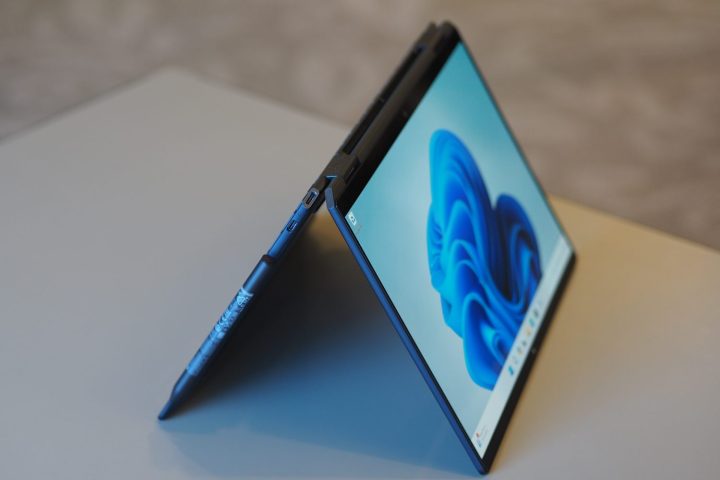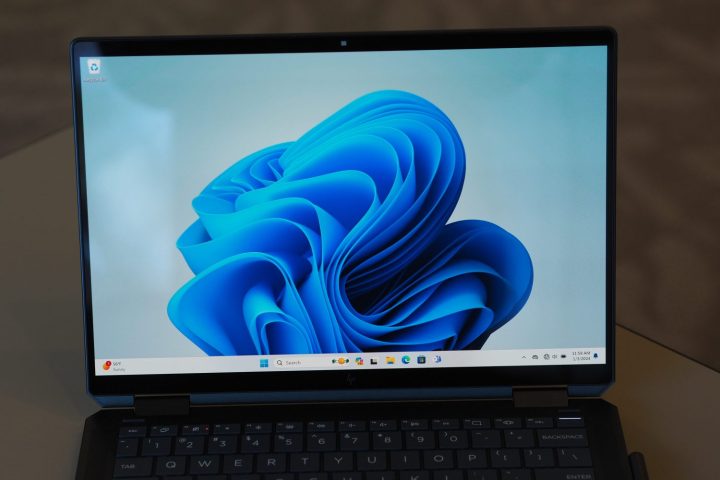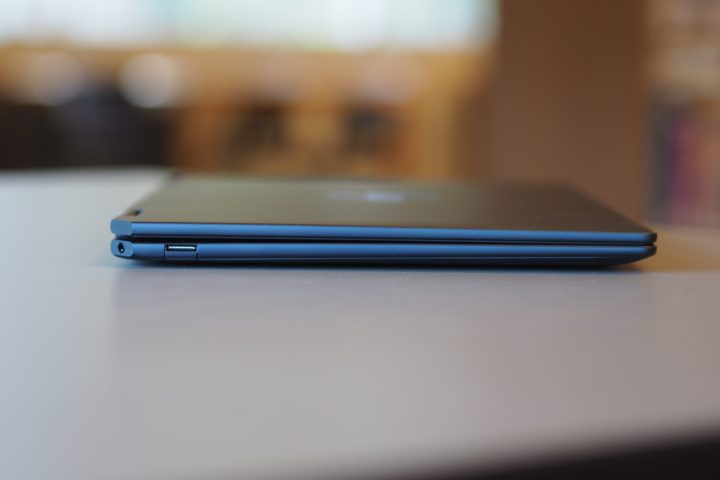HP Spectre x360 14
MSRP $1,970.00
“The HP Spectre x360 14 is the prettiest, smartest, and fastest convertible 2-in-1 you can buy.”
Pros
- Attractive aesthetic
- Very good productivity performance
- Good to great battery life
- Excellent haptic touchpad
- Superb 120Hz OLED display
- Superior audio quality
Cons
- No discrete GPU option
- A bit expensive
The HP Spectre x360 has for many years maintained a top spot for me as one of the best laptops. But over time, the design hasn’t changed all that much, with multiple years of small CPU bumps. All that’s changed with the new Spectre x360 14, though.
I was able to conduct an early review of the laptop, which made its debut at CES 2024. Sporting a slightly larger display, a smoother aesthetic, and a new haptic feedback touchpad, there’s nothing here but improvements. Everything considered, HP’s Spectre x360 14 is going to be hard to beat in 2024.
Specs and configurations
| HP Spectre x360 14 | |
| Dimensions | 12.35 inches x 8.68 inches x 0.67 inches |
| Weight | 3.19 pounds |
| Processor | Intel Core Ultra 5 125H Intel Core Ultra 7 155H |
| Graphics | Intel Arc graphics |
| RAM | 16GB 32GB |
| Display | 14.0-inch 16:10 2.8K (2,880 x 1,800) OLED, 120Hz |
| Storage | 512GB SSD 1TB SSD 2TB SSD |
| Touch | Yes |
| Ports | 2 x USB-C with Thunderbolt 4 1 x USB-A 1 x 3.5mm audio jack |
| Wireless | Wi-Fi 6E and Bluetooth 5.3 Wi-Fi 7 and Bluetooth 5.4 |
| Webcam | 9MP with infrared camera for Windows 11 Hello |
| Operating system | Windows 11 |
| Battery | 68 watt-hour |
| Price |
$1,650+ |
Pricing is still being finalized, but as of the writing of this review, the Spectre x360 14’s starting price is $1,650. Presumably, that’s for the entry-level configuration of an Intel Core Ultra 5 125H CPU, 16GB of RAM, and a 512GB SSD. My review configuration with a Core Ultra 7 155H, 32GB of RAM, and a 2TB SSD is $1,970, which would be a very reasonable price for a heavily upgraded machine.
These prices are subject to change when the laptop starts rolling out, but unless they drop considerably, the Spectre x360 14 is solidly in premium laptop territory.
Design and ports

From a distance, the Spectre x360 14 looks a lot like its predecessor. Up close, though, it’s a different story. The notched display corners remain, with one housing a Thunderbolt 4 port and the other a 3.5mm audio jack, retaining the Spectre’s most iconic — and convenient — design element.
But the chassis edges have been smoothed out and now carry the same color as the rest of the chassis, specifically Nightfall black, Slate blue, or Sahara silver. Those changes create a more minimalist aesthetic that I find even more attractive than the previous generation. You won’t mistake the Spectre x360 14 for a MacBook Pro, but I think it looks just as good. The Spectre also looks great with the display open, with thin speaker grills flanking a spacious, off-color keyboard with large lettering and a large haptic touchpad that takes up the available space on the palm rest.
The Spectre x360 14 also retains the line’s usual excellent build quality, with no bending, flexing, or twisting in the CNC-machined lid and chassis. The hinge isn’t quite as smooth as Apple’s or the dual-clutch version Dell uses on its XPS laptops, but then the Spectre x360 14 is a convertible 2-in-1 and requires a different mechanism to support the full 360-degree rotation.
Speaking of that, the bottom display bezel is larger to accommodate a 2-in-1’s flexibility, giving the Spectre a slightly less modern appearance.
Interestingly, despite boasting a display that’s half an inch larger, the new model is only slightly wider than the previous model. It’s equally deep and thin, and it weighs just a few ounces more. That makes it just as portable while offering significantly more screen real estate. The MacBook Pro 14 is around the same width and depth, but it’s thinner and heavier. That makes the MacBook Pro feel denser in hand.
Connectivity is OK for a 14-inch laptop, with a pair of Thunderbolt 4 ports and a single USB-A port to go with a 3.5mm audio jack. Some 14-inch laptops, like the MacBook Pro 14, also include an HDMI port, and the new Spectre drops the microSD card reader that was in the previous model. That’s disappointing. Wireless connectivity, though, is an improvement thanks to the laptop’s Meteor Lake chipset, with Wi-Fi 7 and Bluetooth 5.4 to go with Wi-Fi 6E and Bluetooth 5.3.
Keyboard and touchpad

The Spectre x360 14’s keyboard has large keycaps and plenty of key spacing, and the switches are light and clicky. They feel less snappy than past versions, though, so I wasn’t quite as enamored with them. Apple’s Magic Keyboard remains the best, and I’d rank Dell’s XPS keyboard ahead of this one as well. It’s still a very good keyboard, just not as good as I remember.
In a move that’s just starting to gain momentum industrywide, HP has finally included a haptic touchpad on the Spectre. I’ve used a few haptic touchpads on other Windows laptops, and none have been as good as Apple’s Force Touch version. They’ve been less responsive with their fabricated clicks, and some have had issues holding onto clicks too long, causing an unnatural feel and inadvertent screen interactions.
The Spectre x360 14’s implementation, though, is almost as good as Apple’s. It’s larger than the touchpad on the MacBook Pro 14, surprisingly, and it feels just as natural. In this regard, the Spectre is the first Windows laptop that rivals Apple. The only thing missing from HP’s touchpad is Apple’s Force Click feature, which adds a convenient means to quickly access additional functionality.
Of course, the Spectre x360 14 is a convertible 2-in-1, so it also has a touch display with active pen support. That sets it apart from any MacBook, and I miss it when using an Apple machine. HP’s pen support is excellent, and if you like to draw or take notes, then the Spectre x360 14 is a great platform — assuming you don’t mind holding onto a tablet that weighs more than 3 pounds.
AI everywhere

AI is one of the hot topics of 2024, and much is being made of the Neural Processing Unit (NPU) integrated into Meteor Lake to speed up various AI tasks. To date, just how AI will be used in our day-to-day computing hasn’t been fully explained, but HP gives a hint in its press materials, where it talks a good deal about how AI has improved several key aspects of the Spectre’s performance.
To begin with, HP has always offered some of the highest-resolution webcams, and they’ve bumped up the Spectre x360 14’s version from 5MP to 9MP with built-in, hardware-enabled lowlight adjustments. More than that, though, HP also touts AI-reduced power usage when Windows Studio Effects is utilized for better background blurring and automatic framing. The webcam and associated software worked well, but I couldn’t say it’s better than other non-AI incarnations.
The Spectre x360 14 also uses the NPU to drive its user presence-sensing technology. Thanks to the infrared camera that also supports Windows 11 Hello facial recognition, the Spectre can lock the laptop and put it to sleep when the user walks away and unlock and wake the laptop when the user returns. The screen can also dim when the user looks away from it.
AI is further used to enhance how performance, fan noise, and heat are optimized based on open apps, the Spectre’s physical placement, and how much battery life remains. HP even mentions AI in the context of automatically adjusting the display’s refresh rate from 48Hz to 120Hz.

It’s unclear how AI makes these features better than they’ve been on earlier models, but presumably, things are smoother and more responsive. That’s not something I could test, however.
HP also gives some other examples of how the NPU can be utilized, including faster generative AI performance in GIMP’s Stable Diffusion function and AI video editing using the Adobe Premiere Pro beta.
Perhaps most interesting was a reference to “Superpower,” a personal AI assistant that runs on the NPU and can perform actions like managing action items from a meeting, summarizing a topic, writing an email, and other tasks. I couldn’t test that functionality either, but clearly, AI will impact our computing in some unforeseen ways.
Performance

AI aside, Meteor Lake is also supposed to provide faster performance and better efficiency, with a new architecture involving technical details that are beyond the scope of this review. I tested the Spectre with the Core Ultra 7 155H, a 28-watt CPU with 16 cores (six Performance, eight Efficient, and two Low Power Efficient) and 22 threads running at up to 4.8GHz. The laptop can also be configured with the Core Ultra 5 125H with 14 cores (four Performance, eight Efficient, and two LP Efficient) and 18 threads running at up to 4.5GHz.
Specs and architectures aside, my Spectre x360 14 review unit provided CPU-intensive performance that falls somewhere in between the 28-watt, 12-core Core i7-1360P and the 45-watt, 14-core Core i7-13700H. Looking at our database, the Spectre performs more closely to the Lenovo Yoga 9i Gen 8 with the Core i7-1360P than the Asus Zenbook 14X OLED with the Core i7-13700H. That is, it was around as fast as the Yoga in multi-core processes while being slower than both in single-core tasks. Notably, Apple’s M3 processor provides around the same multi-core performance, again with faster single-core performance.
I also ran the PugetBench Premiere Pro benchmark, which runs in a live version of Adobe’s Premiere Pro and can use the GPU to speed up various processes. I wouldn’t normally run that benchmark on this class of laptops, but I wanted to see how the Intel Arc graphics performed. On Meteor Lake, Arc is Intel’s newest integrated graphics, utilizing eight Intel Xe GPU cores and promising faster performance than the previous Intel Iris Xe graphics.
Unfortunately, the Spectre didn’t perform well, hitting just 258 in the benchmark. We haven’t run this version of PugetBench on any laptops with Intel Iris graphics, but the Acer Swift X 14 with a Core i7-13700H and the entry-level Nvidia RTX 4050 discrete GPU managed a score of 545. That’s right, the Spectre was just half as fast. Consider that the fastest laptop we’ve tested is the MacBook Pro 14 with the M3 Max that managed a score of 889.

It’s still early, and it’s entirely possible that firmware updates will improve things. So far, though, Meteor Lake isn’t shaking up laptop performance — the Spectre x360 14 is a strong performer for demanding productivity use and unsuitable for anything but light creative work. It’s fast enough, just not a game-changer.
Note that I didn’t test gaming on the Spectre x360 14. My editor, Luke Larsen, covered gaming in his overview of Meteor Lake in the Acer Swift Go 14. I did run the 3DMark Time Spy, though, where the Intel Arc graphics hit a score that’s improved over Intel Iris Xe, but less than half that of the RTX 4050.
That result and Luke’s experience means that while you can game a little better on the Spectre than on the previous model, the difference won’t be significant. The laptop’s going to let you run older titles, and you’ll need to turn the graphics all the way down if you want to run any modern games.
It’s also worth noting that HP doesn’t sell an option with discrete graphics. GPUs have always been a weakness of the Spectre series of laptops, and that’s also true here. Now that the Spectre x360 is in the 14-inch category, it’s lack of an option for something like an RTX 4050 is more apparent. Look at the new Dell XPS 14, for example.
| Geekbench 5 (single / multi) |
Handbrake (seconds) |
Cinebench R23 (single / multi) |
PCMark 10 Complete | |
| HP Spectre x360 14 (Core Ultra 7 155H) |
Bal: 1,588 / 10,548 Perf: N/A |
Bal: 111 Perf: N/A |
Bal: 1,750 / 9,832 Perf: N/A |
6,316 |
| HP Spectre x360 13.5 (Core i7-1255U) |
Bal: 1,566 / 7,314 Perf: 1,593 / 7,921 |
Bal: 169 Perf: 120 |
Bal: 1,623 / 5,823 Perf: 1,691 / 7,832 |
5,203 |
| Lenovo ThinkBook Plus Gen 4 (Core i7-1355U) |
Bal: 1,756 / 7,218 Perf: 1,843 / 7,494 |
Bal: 157 Perf: 128 |
Bal: 1,736 / 6,674 Perf: 1,819 / 8,002 |
5,571 |
| Lenovo Yoga 9i Gen 8 (Core i7-1360P) | Bal: 1,843 / 8,814 Perf: 1,835 / 10,008 |
Bal: 122 Perf: 101 |
Bal: 1,846 / 8,779 Perf: 1,906 / 9,849 | 6,102 |
| Asus Zenbook 14X OLED (Core i7-13700H) | Bal: 1,848 / 11,157 Perf: 1,852 / 11,160 |
Bal: 84 Perf: 82 |
Bal: 1,819 / 11,066 Perf: 1,826 / 12,795 | 6,020 |
| HP Pavilion Plus 14 2023 (Ryzen 7 7840U) |
Bal: 1,819 / 9,655 Perf: N/A |
Bal: 84 Perf: N/A |
Bal: 1,721 / 12,234 Perf: N/A |
6,804 |
| Apple iMac (M3) |
Bal: 3,075 / Perf: 11,994 Perf: N/A |
Bal: 112 Perf: N/A |
Bal: 1,905 / 9,754 Perf: N/A |
N/A |
The next important question regarding Meteor Lake is battery life. Efficiency is a stated goal of the architecture, and so I expected the Spectre x360 14 to achieve more longevity. The Spectre x360 14 has a 68 watt-hour battery, which is about average for 14-inch laptops, and it has a power-hungry 2.8K OLED display. So, there are factors to consider beyond the CPU by itself.
Considering everything, I’m at a loss to say whether the Core Ultra 7 155H is a particularly efficient processor. The Spectre hit eight hours in our web-browsing test and 18 hours in our video-looping test. The former is about average, while the latter is well above average. The previous-generation Spectre x360 13.5 with an OLED display and a lower-power 15-watt Intel Core i7-1255U hit 10 hours in the web-browsing test and 14 hours in the video-looping test. That machine wasn’t nearly as fast, however. And then we need to consider Apple’s MacBook Pro 14, which lasts closer to 18 hours in both tests with a very fast CPU and a mini-LED display.
We’ll have to wait to test more Meteor Lake laptops to draw meaningful conclusions. For now, suffice it to say that the Spectre x360 14 might last a full day of work, depending on how you’re using it. But I can’t say for sure.
An excellent OLED display and much-improved audio

There’s not much to say about the Spectre x360 14’s 2.8K OLED display that hasn’t been said about so many similar displays in the past. It looks incredible out of the box, with bright, dynamic colors and inky blacks. Watching high dynamic range (HDR) video is a treat, and it’s even better with content from Disney+ that supports the IMAX technology built into the Spectre. That provides unique aspect ratios and enhanced sound, and it works well.
My colorimeter agreed. The OLED panel is bright enough at 391 nits, well above our 300-nit threshold for working in bright indoor conditions. Blacks were perfectly black, with incredible contrast that’s beyond meaningful measurement. Colors were wide at 100% of sRGB, 97% of AdobeRGB, and 100% of DCI-P3, with excellent accuracy at a Delta-E of 0.68 (anything less than 1.0 is indistinguishable to the human eye).
In short, the display is sharp enough and offers superb image quality. It’s suitable for every kind of user, whether for productivity, creativity, or media consumption.

The Spectre x360 14 also features quad speakers with Poly audio tuning, including two upward-firing tweeters and two front-firing woofers. My standard for great audio has been Apple’s MacBook Pros, which use six speakers and force-cancelling subwoofers to produce loud, dynamic, and deep audio that no other laptop can match.
I can happily say that the Spectre comes surprisingly close, with plenty of distortion-free volume, crystal clear mids and highs, and more bass than any other 14-inch Windows laptop I’ve tested. It may not be quite as good as the MacBook Pro, but the Spectre pumps out excellent sound that will stop you from reaching for a pair of headphones.
Meaningful improvements add up to a superior 2-in-1
There may be questions regarding the Meteor Lake chipset’s performance and efficiency, but that’s not to say that the Spectre x360 14 is a poor performer. It’s plenty fast for all but demanding creators and offers good to great battery life. Its display and audio are excellent, and the new design is attractive and functional.
There’s a lot to like about the Spectre x360 14, so I’m giving it a near-perfect rating as the best convertible 2-in-1 I’ve used. Perhaps HP will better tune the Meteor Lake chipset for improved performance and efficiency. And I do question the real value of all the AI that’s talked about in the marketing materials. But as it is, I can give the Spectre my strongest recommendation.
Editors’ Recommendations



